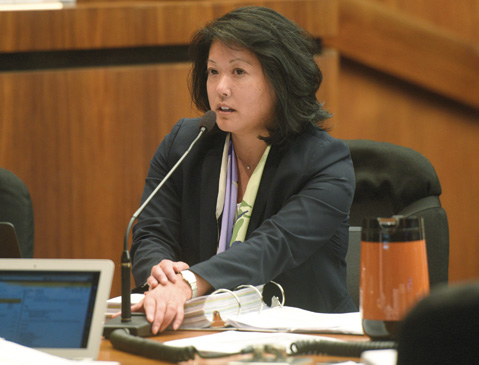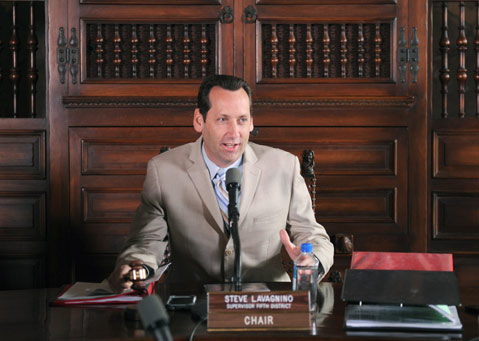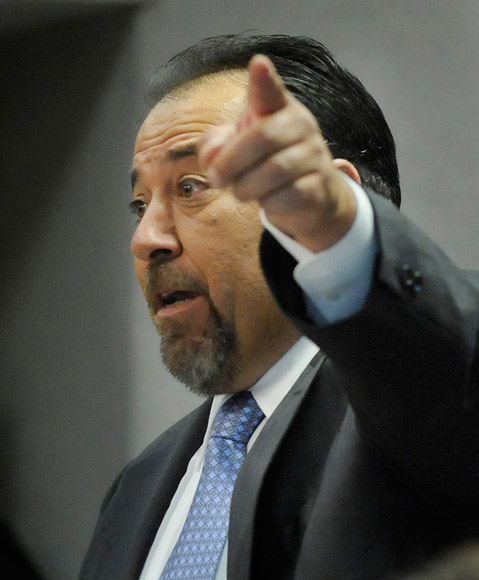S.B. Supervisor, CEO Take Opposite Sides During D.C. Camp 4 Hearing
Congressional Subcommittee Supports Chumash Annexation Bill

Chumash tribal chair Vincent Armenta, Santa Barbara County CEO Mona Miyasato, and Supervisor Steve Lavagnino flew to Washington, D.C., this week for what turned out to be a fairly heated Congressional hearing on a federal bill that would allow the Chumash to annex Camp 4.
HR 1157 is the second federal bill sponsored by Congressmember Doug LaMalfa — who represents a Northern California district — that would place the 1,400-acre property into trust, bypassing the Bureau of Indian Affairs (BIA) application currently tied up in appeal.
Last week, the supervisors voted 3-2 to send CEO Miyasato to the Indian, Insular and Alaska Native Affairs subcommittee hearing to represent the board after Supervisor Doreen Farr — whose district includes the Santa Ynez Valley — said she could not attend because of a family matter.

On behalf of supervisors Farr, Janet Wolf, and Peter Adam, Miyasato voiced opposition to the bill, contending federal action would short-circuit the county’s pending appeal. The appeal contends that the annexation of Camp 4 would lead to “substantial, negative impacts” and lost tax dollars. It also questions whether there is a legitimate tribal need for a property 10 times larger than the existing Chumash reservation.
Supervisors Steve Lavagnino and Salud Carbajal have both called for county officials to negotiate with the tribe as they do with other government entities. Lavagnino took a red-eye flight to D.C. to speak at the Wednesday-morning hearing. “I should not be needed here today, and this piece of legislation should have never been necessary,” he said. But “protections [of most human rights] are not afforded to the tribe … I believe the tribe has thoroughly exhausted all avenues in search of reaching an agreement.”
In an interview on Tuesday, Farr was taken aback by Lavagnino’s decision to attend the hearing. “It doesn’t seem right that anyone would try to undermine” the official county position, she said. Farr claimed county representatives have tried but failed to negotiate with the tribe on three separate occasions.
For his part, Lavagnino said, “I’m not sure I know anyone who would turn down the chance to testify [before Congress] when invited.” He noted he has reservations about the bill but believes multiple local perspectives should be heard in D.C. In his testimony, he contended that a different development next to Camp 4 calls for even more density than the tribe’s plans and that any construction would fall under National Environmental Policy Act regulations.

Armenta argued that the Chumash’s housing shortage warrants building on Camp 4. He told the subcommittee that the tribe already pays more than its fair share for county fire and law enforcement services.
According to LaMalfa’s spokesperson Kevin Eastman, the bill contains a prohibition on gaming on the property. “Contrary to misinformation spread by some opponents, the tribe would be unable to build a casino or move their existing facility to the Camp 4 property,” Eastman wrote in an email.
Opposing the current measure as she did last year’s bill, Congressmember Lois Capps — a member of the Committee on Natural Resources that oversees the subcommittee — took exception to the fact that the LaMalfa’s bill encroaches on her district. “I alone have been elected by the people of the 24th District to represent them here in Congress,” she said. She also argued that the BIA process is still underway; ending it early “hardly seems appropriate,” she said.
Last summer, the tribe received a 6.9-acre plot adjacent to their reservation after the Interior Board of Indian Appeals (IBIA) ruled in their favor after a long appeal process. A number of valley residents — like members of the group Preservation of Los Olivos (POLO) — appealed the fee-to-trust application, claiming that nothing would stop the tribe from extending gambling on the site.
Last year’s federal legislation — HR 3313 — died before a subcommittee hearing was ever held on the matter. Though they did not vote on the bill, members of the subcommittee who spoke at the hearing on Wednesday were largely supportive of the measure, calling it their duty to support housing rights.
“They are a sovereign nation, and for any institution not to recognize that is backwards,” said Congressmember Raul Ruiz, a Democrat who represents Riverside. Subcommittee chair Don Young threatened to move the bill forward if Miyasato does not negotiate further with the tribe.



